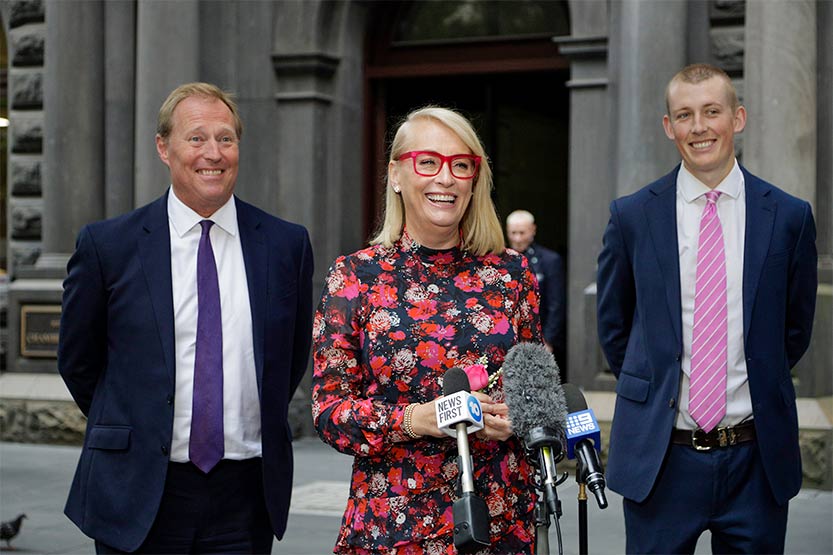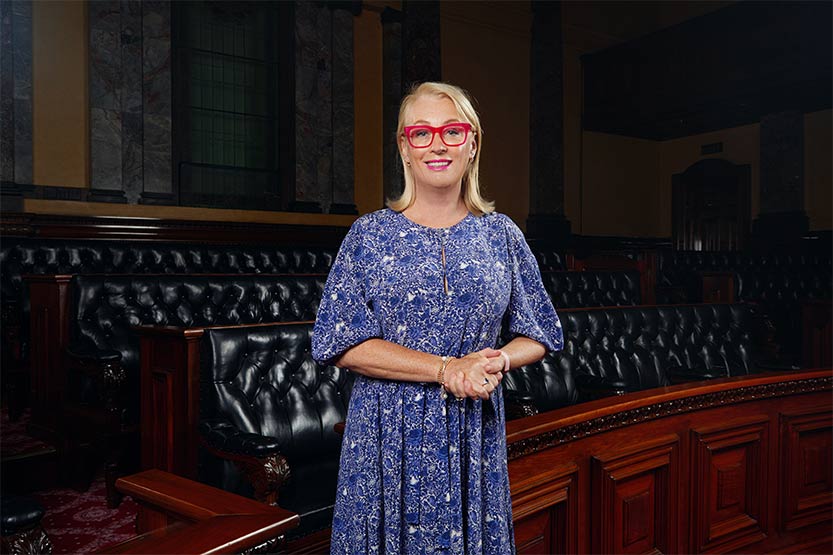Sally Capp bows out on her terms
Sally Capp, the Lord Mayor who brought a new lease of life, energy, and dynamism to the role at a time when it was needed more than ever, ended weeks of speculation on March 28, announcing she would be resigning come the end of June.
It marks the end of an era for the City of Melbourne during what many could reasonably argue have been six of its most challenging years, marred by sexual scandal, a once-in-a-generation pandemic, and now, a major cost-of-living crisis.
Cr Capp’s decision not to recontest at October’s local government elections comes as a surprise to many. With plenty of unfinished business at Town Hall, namely her signature Greenline project, there’s certainly no shortage of city-shaping challenges she could have sunk her teeth into during another four-year term.
However, to those following council affairs and who know her best, the news will perhaps come as less of a shock given it’s that famous energy, or “buzz”, that her leadership has become renowned for since coming into the role in 2018.
It’s been a hallmark of her approach to Lord Mayor that has at times been noticeably lacking since the start of the new year, as the strain of the past six years and the weight of this decision perhaps began to take its toll.
“I have given everything to this role,” Cr Capp said on March 28. “I love this job – it is an honour and privilege to represent the people of Melbourne.”
“As you know, I like to work at full pace, full-time, and I believe that anyone contesting the election must be all-in for a full term.”
I have decided that at 56, having spent my 50s so far at Town Hall, it’s time for me to seek new opportunities to propel me into my next decade.
“To ensure good governance and transparency”, Cr Capp said she would work with councillors and the CEO on an orderly transition plan during her final three months before handing over the reins to her current deputy Nicholas Reece.

However, while her resignation may have been expected by some more than others, the timing of her announcement on an otherwise usually quiet Thursday leading into the Easter break certainly caught many off-guard.
To her growing share of critics, Cr Capp’s resignation has been viewed as a cut-and-run job at a time when the city is still struggling post-COVID, leaving behind a council in debt and without clear vision.
But in the eyes of her supporters, she has led Melbourne through its most tumultuous period, and given the extraordinary impacts of the pandemic which resulted in the world’s longest lockdowns, the city has recovered remarkably well on her watch.
“Despite this [lockdowns], together we have driven the revitalisation of this magnificent city – emerging as Australia’s largest city, the world’s third most liveable, and the fourth best student city globally,” Cr Capp said upon announcing her resignation.
“We have seen record breaking crowds at every major event recently, driving up foot traffic and boosting business across the city.”
“I know hardship is still a reality for many business owners and residents, but the upward trajectory is undeniable. We are once again the driver of Victoria’s economy and a major contributor on the national stage.”
Politics can be a harsh, ruthless and, at times, thankless affair – a fact that Cr Capp, who had never been a politician prior to her Lord Mayoralty, was forced to learn fast after swapping the private sector for public service.
Those who denounce her leadership say the city has become an unpleasant, dangerous and graffiti-plagued experience, thanks in part to a “woke” agenda where bike lanes, social equality and climate are prioritised over “roads, rates, and rubbish”.
This is despite the council having tripled its investment in city cleaning during her tenure, delivering the largest events program in the country, and investing more money in infrastructure projects than ever before.
In the words of Midnight Oil, politics is notorious for having “a short memory”. To Cr Capp’s plaudits, the context in which she thrust herself into the city’s top job, and the ensuing circumstances that followed, have been anything but smooth sailing.
We can’t forget the cultural ruin that was Town Hall in 2018 following allegations of sexual misconduct made by multiple councillors against former Lord Mayor Robert Doyle. In Sally’s own words, the council was “was in dire need of leadership when I was elected”.
Given the “significant internal and external issues” at the time, the manner in which she helped the City of Melbourne quickly rebuild its image amid the battle to make Town Hall a safer workplace for women cannot be understated.
This will undoubtedly go down as a major part of her legacy as Lord Mayor – one largely attributed to her exceptional communication and public speaking skills. When it came to championing all things Melbourne, few have done it better.
She also boasted a tremendous work ethic and, in many ways, brought the role of Lord Mayor back to the grassroots by being as ever-present at resident and community group meetings as at major events and sod turnings.
Another significant part of her legacy is being the first woman directly elected as Lord Mayor of Melbourne, and she is just the third woman to serve in the role. Providing inspiration for more women and girls to pursue a political career was something she said she took great pride in.

“I’ve spent a lot of time during my tenure speaking with groups of people, but especially women who are interested in putting their hand up for public office,” she said.
“It takes quite a lot of courage just to put your hand up and campaign, and I really hope that with my encouragement more women will consider running for public office. It’s an honour and a privilege.”
And finally, and perhaps most significantly, she will also go down in history as the Lord Mayor to have steered Melbourne through the COVID pandemic and drive its recovery out it.
Just over two years since lockdowns finally lifted, the impacts of their devastation still reverberate right across the city. In Cr Capp’s own words, the “rhythm of the city has changed”, and unfortunately, there are no quick fixes to some of these challenges.
But she thanked the current “Team Melbourne” for providing a solid bedrock for future councils to continue the “upwards trajectory” for Melbourne, saying she was “so proud of our achievements as a council over the past six years.”
“I want to acknowledge the City of Melbourne team and Melbourne’s residents, traders and stakeholders across industries that are so critical to this city. Your passion has been evident to me every day and has shaped a council program focused on what our city needs and how we can make a positive difference together,” she said.
While only time will tell whether Greenline, her pet project that she took to the 2020 election, will succeed without her leadership to see it all the way along the north bank of the Yarra-Birrarung, she claimed that she was happy to “set it free”.
She said she was confident that it, along with renewing the Queen Victoria Market precinct, homelessness housing initiative Make Room, and the Power Melbourne battery scheme – projects she listed among her personal highlights – would “flourish” without her.
“These are projects with full endorsement of the council, of great popularity and support across community and the private sector, and as the saying goes, ‘when you love something, set it free’, and I am setting those projects free. I’m sure that they will flourish,” Cr Capp said.
And notwithstanding “plenty to do before I leave, including delivering the final annual plan and budget of this council term,” Sally Capp calls time on a memorable journey as Lord Mayor of Melbourne, having done it her way all along.
Thank you, Sally, for your dedication to Melbourne. •

Sally Capp: one last chat as Lord Mayor of Melbourne







 Download the Latest Edition
Download the Latest Edition